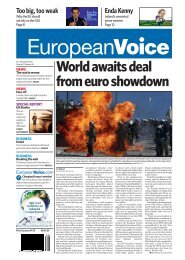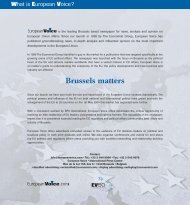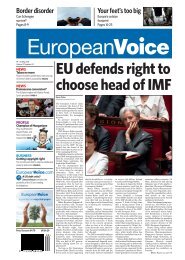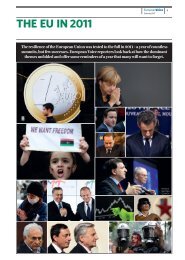special report - European Voice
special report - European Voice
special report - European Voice
You also want an ePaper? Increase the reach of your titles
YUMPU automatically turns print PDFs into web optimized ePapers that Google loves.
CROATIA<br />
30 May 2013<br />
19<br />
Željko Jovanović Minister of sport,<br />
education and science<br />
In sports-mad Croatia, a minister<br />
for sport does not lack profile.<br />
But Željko Jovanović has a political<br />
prominence in a different<br />
league from his portfolio. There<br />
are two reasons. He is an ethnic<br />
Serb in a post that has required<br />
him to try to cool virulent nationalism<br />
in the stadium, often directed<br />
at Serbs. It is not just hooligans that he riles – the owner of<br />
leading Croatian football club Dinamo Zagreb has insulted him<br />
publicly as someone who by definition works against Croatia<br />
because of his ethnic background. That is quite a charge to level<br />
against a 48-year-old who participated in the Serb-Croat war of<br />
1991-95 on the Croat side – albeit as a medic.<br />
Jovanović himself has a warrior side, of the cultural sort. In the<br />
23 years since he first entered parliament, he has established<br />
himself as a leading liberal within the Social Democrats on social<br />
issues, giving the right (as well as the far-right) an extra reason to<br />
loathe him. The latest clash has been over his introduction of sex<br />
education into primary schools. Jovanović pushed it through<br />
without the usual consultative process, causing fury among<br />
lawyers as well as his political opponents. He has responded with<br />
ad hominem attacks on judges. In the reactions he prompts and<br />
some of his own actions, Jovanovićis a reminder that an<br />
unhealthy hothouse quality persists in Croatian politics.<br />
AG<br />
Neven Mimica <strong>European</strong> commissioner-designate<br />
When Croatia joins the Union on 1 July, Neven Mimica is slated to<br />
become the country’s first <strong>European</strong> commissioner. His hearing<br />
before the <strong>European</strong> Parliament is scheduled for next Tuesday (4<br />
June).<br />
From Split, Mimica is an economist and trade <strong>special</strong>ist by background.<br />
He served in various diplomatic functions from 1978, both<br />
for Croatia and for Yugoslavia, in an era when the Yugoslav<br />
republics had their own diplomatic relations with foreign countries –<br />
up to a point.<br />
After Croatia declared independence in 1991, Mimica became assistant trade minister and served<br />
in senior posts in Cairo and Ankara before his appointment as chief negotiator for the pre-accession<br />
Stabilisation and Association Agreement with the EU in 2000-01, and as minister for <strong>European</strong> integration<br />
in the Social Democratic-led government in 2001-03. A technocrat, he joined the SDP in<br />
2004 and was a member of parliament in 2004-11, serving as chairman of the <strong>European</strong> integration<br />
committee. With Mimica, Milanović’s government will lose a minister who is seen as very capable<br />
and an achiever. He is also very close to Milanović personally.<br />
TV<br />
Ranko Ostojić Interior minister<br />
Born in 1962 in Split, Croatia’s second city, Ranko Ostojić, a lawyer<br />
by training, stood for mayor of Split in 2009 but was defeated by<br />
Željko Kerum, a populist supermarket magnate not affiliated to any<br />
party, who was voted out earlier this month. Ostojić has a strong<br />
local base in Split and is seen as possible leadership material in the<br />
SDP. Before his appointment as interior minister, he was a member<br />
of parliament in 2007-11.<br />
Ostojić’s public career started out in municipal affairs. He was<br />
head of resources for his native city in 1997-2000 and briefly served as head of the regional police<br />
department, before becoming assistant minister and chief of Croatia’s police in the first SDP-led national<br />
government in 2001-04. He worked as an executive of Slobodna Dalmacija, Split’s main daily,<br />
in 2005-07.<br />
(Not to be confused with Rajko Ostojić, the health minister, who is standing for mayor of Zagreb in<br />
a run-off election next Sunday.)<br />
TV<br />
MEPs<br />
Croatia’s 12 MEPs were elected on 14<br />
April, in an election surprisingly dominated<br />
by the centre-right Croatian Democratic<br />
Union (HDZ), Croatia’s main opposition<br />
party and a member of the <strong>European</strong><br />
People’s Party. Previously, the country had<br />
had only observer MEPs, sent from its<br />
national parliament, the Sabor.<br />
The HDZ managed to double the number<br />
of observer MEPs it had to six, while<br />
the ruling Social Democratic Party (SPD) –<br />
whose MEPs are part of the Socialists and<br />
Democrats group in the <strong>European</strong> Parliament<br />
– declined from six to five seats. The<br />
small Labour Party kept its one seat, while<br />
three smaller parties lost theirs. Turnout<br />
was just 20.8%. The new MEPs will serve<br />
until Parliament reconvenes after EU-wide<br />
elections in May 2014. Croatia will then<br />
lose one seat, as will several other member<br />
states, to ensure that the total of<br />
MEPs complies with the provisions of the<br />
Lisbon treaty.<br />
Croatia’s 3.7 million voters were asked to<br />
rank individual candidates on party lists,<br />
rather than voting for a closed party list as<br />
had been the practice before.<br />
The SPD’s Tonino Picula, a sociology professor<br />
who served as foreign minister in<br />
the party’s first government in 2000-03,<br />
achieved the best result by far, with<br />
106,000 votes. He was followed by Ruža<br />
Tomašić, the Eurosceptic and socially conservative<br />
candidate of a small right-wing<br />
party who, as part of an electoral alliance,<br />
Slavko Linić Finance minister<br />
When Neven Mimica becomes<br />
Croatia’s <strong>European</strong> commissioner,<br />
Slavko Linić will be the only<br />
member of the Croatian cabinet<br />
to have served as a senior minister<br />
in a previous government.<br />
That detail belies a more important<br />
point – that Linić, now<br />
Croatia’s finance minister, has for<br />
years been a leader in his own<br />
right. Indeed, he is perhaps the<br />
most plausible alternative leader,<br />
though not a rival, to Prime Minister<br />
Zoran Milanović among the<br />
Social Democrats. He is not close<br />
to Milanović, either personally or<br />
in age.<br />
At 63, he has behind him a career that includes ten years as the<br />
mayor of Rijeka, a regional power base that served as a springboard<br />
to three years as deputy prime minister to the Social Democrats’<br />
late doyen, Ivica Račan, in 2000-03. In the years between<br />
ministerial posts, he consolidated his political standing<br />
with the chairmanship of two parliamentary committees.<br />
Through those years in local government, national government<br />
and in parliament, he has maintained a reputation for competence.<br />
Now, Linić, whose career began in managing businesses’<br />
finances, faces the greatest test of his financial acumen.<br />
AG<br />
Orsat Miljenić<br />
Justice minister<br />
A lawyer, Orsat Miljenić was<br />
born in Dubrovnik and is a<br />
founding member of Transparency<br />
International Croatia.<br />
As justice minister, he is in<br />
charge of Croatia’s fight<br />
against corruption. In 1996-<br />
2000, he worked for the foreign<br />
ministry and was posted<br />
as a diplomat to the Netherlands.<br />
In 2000-02, he was<br />
head of the government office<br />
managing relations with the<br />
UN war crimes tribunal for the<br />
former Yugoslavia and rose, in<br />
2002-04, to be assistant minister<br />
and then deputy minister<br />
for <strong>European</strong> integration.<br />
He practiced law from 2004<br />
until his appointment as minister,<br />
without political affiliation.<br />
TV<br />
had been included on the HDZ list.<br />
Tomašić, a former police officer in<br />
Toronto, got the best result on the entire<br />
opposition side, with close to 62,000<br />
votes. Next highest was the HDZ’s Andrej<br />
Plenković, a career diplomat who was<br />
state secretary for Europe in the Kosor<br />
administration, with 36,000 votes.<br />
The HDZ-led coalition also includes<br />
Dubravka Šuica, Davor Ivo Stier, Ivana<br />
Maletić and Zdravka Bušić. Biljana<br />
Borzan, Marino Baldini, Oleg Valjalo and<br />
Sandra Petrović Jakovina are the other<br />
MEPs from the SPD-led alliance. Nikola<br />
Vuljanić is the Labour Party’s MEP; as an<br />
observer, he was affiliated with the S&D<br />
group.<br />
TV<br />
A troubled history<br />
Croatia 1991-present<br />
Croatia declared independence<br />
from the crumbling Yugoslavia in<br />
June 1991, together with Slovenia,<br />
its neighbour to the north-west.<br />
The Yugoslav People’s Army<br />
(JNA), which by then had come<br />
under the sway of Serbian<br />
strongman Slobodan Milošević,<br />
attacked both republics, but withdrew<br />
from Slovenia after a tenday<br />
war to focus on Croatia, with<br />
its sizeable ethnic Serb population.<br />
That autumn, the JNA’s brutal<br />
siege of the towns of Osijek and<br />
Vukovar prompted outrage –<br />
e<strong>special</strong>ly in Germany, whose<br />
diplomacy was instrumental in<br />
the EU’s decision in mid-December<br />
1991 to recognise the two<br />
republics on 15 January 1992.<br />
Croatia’s separation from<br />
Yugoslavia was bloody and traumatic,<br />
with the JNA and Serbian<br />
paramilitaries taking control of<br />
large swathes of territory along<br />
the border with Serbia and with<br />
Bosnia and Herzegovina, to which<br />
the war spread in the spring of<br />
1992. Non-Serbs were violently<br />
expelled from those areas, a practice<br />
that brought the term ‘ethnic<br />
cleansing’ back into the political<br />
vocabulary.<br />
In the spring and summer of<br />
1995, after three years of stalemate<br />
in Croatia, the Croatian<br />
army, with US assistance,<br />
launched two lightning offensives<br />
against Serb forces, advancing<br />
deep into Bosnia and forcing<br />
Milošević to the negotiating table<br />
in Dayton, Ohio, in November. The<br />
offensive sent some 200,000<br />
ethnic Serbs fleeing to Serbia and<br />
Serb-held areas of Bosnia and<br />
Herzegovina.<br />
The hard-line nationalist policies<br />
of Franjo Tudjman, Croatia’s<br />
leader, had also wrought havoc in<br />
Bosnia. Croatia initially backed the<br />
Bosnian government but, in 1993,<br />
Tudjman agreed with Milošević to<br />
partition the country, and turned<br />
against his allies in a bid to carve<br />
out a Croatian state within Bosnia.<br />
Perhaps the most poignant symbol<br />
for that bloody struggle is the<br />
divided city of Mostar, in Herzegovina,<br />
whose Ottoman-era<br />
bridge was destroyed by shelling<br />
from units under the command of<br />
a Croatian general, Slobodan<br />
Praljak. Praljak was sentenced to<br />
20 years in prison by the United<br />
Nations war crimes tribunal in<br />
The Hague yesterday (29 May).<br />
The fate of Tudjman’s Croatian<br />
Democratic Union (HDZ), at the<br />
time an extreme nationalist movement<br />
that refused to make any<br />
gesture of accommodation to the<br />
country’s Serb citizens, mirrors<br />
that of Croatia itself. Tudjman’s<br />
death threw the HDZ into an identity<br />
crisis, and it was out of power<br />
between 2000 and 2003. But Ivo<br />
Sanader, its new leader, began<br />
turning the hardline nationalist<br />
grouping into a more mainstream<br />
Christian Democratic party.<br />
Sanader in mid-2009 abruptly<br />
resigned as prime minister in<br />
unexplained circumstances and is<br />
now serving a ten-year prison<br />
sentence for corruption; his<br />
successor, Jadranka Kosor,<br />
continued his modernisation<br />
agenda.<br />
But as important as the HDZ’s<br />
internal renewal were the three<br />
years from 2000 during which<br />
Croatia was governed by coalitions<br />
led by the Social Democratic<br />
Party (SDP) of the late Ivica<br />
Račan. He had been the last<br />
leader of the Yugoslav-era League<br />
of Communists of Croatia, was an<br />
indecisive prime minister, and had<br />
great problems holding his coalition<br />
together. But it was his government<br />
that led Croatia out of its<br />
international isolation and undertook<br />
the reforms that paved the<br />
way for the start of membership<br />
negotiations with the EU in 2005.<br />
Croatia before 1991<br />
An independent mediaeval kingdom<br />
for two centuries until it<br />
came under Hungarian rule in<br />
1102, Croatia was part of the<br />
Habsburg Empire from the early<br />
16th century. For centuries,<br />
Catholic Croatia was on the frontier<br />
with the Ottoman Empire,<br />
which ruled neighbouring Bosnia,<br />
Serbia and Montenegro with their<br />
Muslim and Christian Orthodox<br />
populations, a frontline experience<br />
that has shaped Croatia’s national<br />
identity (and inspired<br />
Samuel Huntington’s notion of a<br />
clash of civilisations). After the<br />
collapse of Habsburg rule in the<br />
First World War, Croatia joined<br />
the other South Slavs (except the<br />
Bulgarians) to form the shortlived<br />
Kingdom of Serbs, Croats<br />
and Slovenes (renamed the Kingdom<br />
of Yugoslavia in 1929).<br />
The kingdom’s dismemberment<br />
by the axis powers in 1941 led to<br />
the creation of the Independent<br />
State of Croatia led by Bosnianborn<br />
Ante Pavelić. “From this<br />
regime,” writes the historian John<br />
Lampe, “sprang the most savage<br />
intolerance seen anywhere in<br />
Europe during the Second World<br />
War outside of the Nazi regime<br />
itself.” Pavelić’s Ustaša regime<br />
and the Jasenovac concentration<br />
camp became synonymous with<br />
the extermination of Jews, Serbs,<br />
Roma and others.<br />
The second Yugoslavia was<br />
founded and dominated by Josip<br />
Broz Tito, partisan leader and perhaps<br />
Croatia’s most famous son<br />
(albeit born to a Slovene mother<br />
in what was then the Habsburg<br />
Empire). Croatia, like the other<br />
Yugoslav republics (Slovenia,<br />
Bosnia and Herzegovina, Serbia,<br />
Montenegro, and Macedonia)<br />
and Serbia’s two autonomous<br />
provinces (Vojvodina and Kosovo),<br />
had a degree of self-rule,<br />
e<strong>special</strong>ly after 1966, within the<br />
confines of one-party rule.<br />
In 1971, Tito purged Croatia’s<br />
liberal leaders in order to rein in<br />
Croatian nationalists who had<br />
benefited from the loosening of<br />
party orthodoxy in the republic;<br />
among those imprisoned was<br />
Franjo Tudjman, who two decades<br />
later would lead the country to<br />
independence following Tito’s<br />
death, and the resurgent Serbian<br />
nationalism it triggered.<br />
Toby Vogel<br />
Ethnicity<br />
The preamble to the Croatian constitution of 1990, amended in 2010,<br />
describes Croatia as “the nation state of the Croatian nation and the<br />
state of the members of its national minorities”, and then goes on to list<br />
22 groups –including Serbs – “and others”. Its adoption in 1990 meant<br />
that ethnic Serbs in Croatia went from being the dominant group in<br />
Yugoslavia to being a minority in Croatia.<br />
In the last pre-war census, in 1991, Serbs made up 12.2% of Croatia’s<br />
population. By the time of the first post-war census, in 2001, the proportion<br />
had dropped to just 4.5%, where its has roughly remained since.<br />
That was largely the effect of the offensive that brought Serb-controlled<br />
territories under government control in the summer of 1995, prompting<br />
a huge exodus of ethnic Serbs.<br />
According to the 2011 census, no other ethnic minority came even<br />
close to 1%, although taken together they made up 7.7% of Croatia’s<br />
population. At the same time, 95.6% of Croatia’s population listed<br />
Croatian as their mother tongue. Just 0.53% of Croatian residents held<br />
foreign citizenship.










